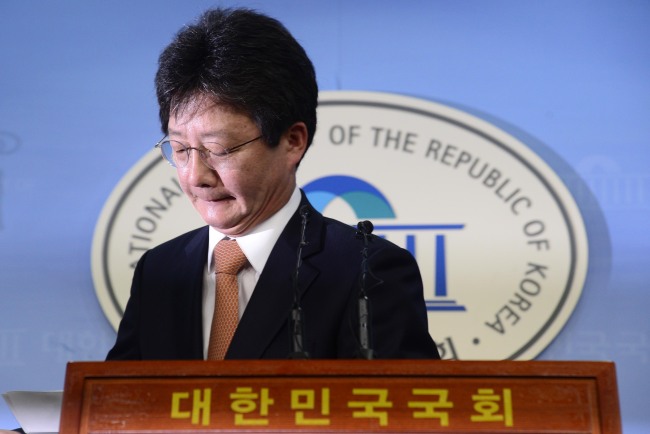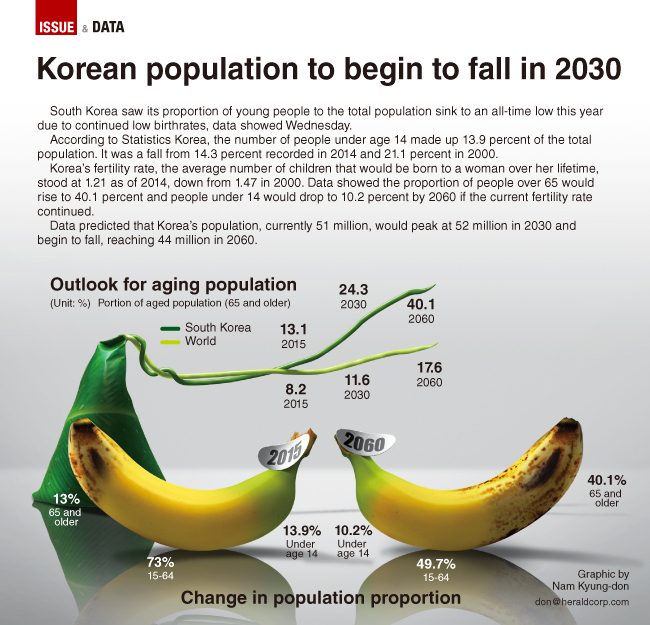Wearing a black suit and a frown, the ruling party whip announced his resignation in a monotone Wednesday, succumbing to days of pressure from party officials loyal to President Park Geun-hye.
But Saenuri Rep. Yoo Seong-min leaves with a higher political profile according to local polls, particularly among voters frustrated with the ruling bloc officials who had hoped that Yoo’s departure would end the intraparty feuding between the pro-Park and non-Park forces.
Yoo appeared to hint that he would continue to oppose policies of the Park administration that he disagreed with, saying that South Korea was a democratic country that took orders from the people.
“The reason I did not step down for the past two weeks, despite the pressure, was that I wanted to uphold our Constitution that declares the Republic of Korea a democratic country, whatever ramification that could have had on my political career,” Yoo said.
“I will continue to pursue my belief that our politics can go beyond partisan differences, that I can achieve my dream of becoming a just and warm conservative, always striving to compromise on differences, and stand by the citizens of this country.”
The embattled third-term lawmaker had been under pressure to forfeit his post since late last month when President Park Geun-hye called him a “traitor” who should be voted out of office during a nationally televised Cabinet meeting.
Park was referring to Yoo’s sponsorship of a bill she vetoed that proposed giving the legislature the power to ask for changes to executive decrees that appeared to undermine existing laws. Park had called the bill unconstitutional as it violated the principle of checks and balances.
Park loyalists in the Saenuri Party, widely known as the “pro-Park” faction, thereafter repeatedly demanded Yoo’s resignation for his role in sponsoring the possibly unconstitutional bill.
Yoo sympathizers, though, said the president’s followers were trying to kick out anti-Park legislators from key party posts before next year’s parliamentary elections. Yoo sympathizers called Park a bully trying to commandeer the party.
The high-profile feud raised Yoo’s popularity according to a weekly poll by Realmeter in the fourth week of June that surveyed 2,500 adults nationwide.
Yoo rose to fourth from sixth on the list of possible presidential candidates in the ruling bloc, ahead of former Saenuri Party lawmaker Chung Mong-joon and South Gyeongsang Province governor Hong Joon-pyo.
The poll had a 95 percent confidence level and a margin of error of plus or minus 2 percent.
The tit-for-tat verbal war between the two factions continued for 13 days before tensions climaxed early Wednesday when the Saenuri Party convened a closed-door party caucus in Seoul’s National Assembly.
After a four-hour debate the caucus presented Yoo with a resolution urging him to resign “for the sake of the party and the Park administration.”
No confidence vote on Yoo was taken, despite such requests from Yoo sympathizers including second-term Rep. Kim Yong-tae. Pro-Park legislators and party chairman Rep. Kim Moo-sung cited the absence of party rules that authorized a confidence vote on an incumbent floor leader.
Yoo apologized for the recent in-house fight.
“I would like to foremost apologize to the ordinary citizens of our country struggling to make ends meet. I have disappointed many.”
“But I was also able to ask myself why, for the past 16 years, I have remained in politics,” Yoo said.
“I have always believed that in the end, it is politics that brings change, despite the fact that we politicians are consistently criticized, satirized and denounced.”
“I am ready to face any criticism of my stubbornness during the last two weeks to uphold justice, the rule of law and principles.”
The party is now to decide how to elect the next floor leader, with party rules specifying that the successor must be named within seven days.
By Jeong Hunny (hj257@heraldcorp.com)
But Saenuri Rep. Yoo Seong-min leaves with a higher political profile according to local polls, particularly among voters frustrated with the ruling bloc officials who had hoped that Yoo’s departure would end the intraparty feuding between the pro-Park and non-Park forces.
Yoo appeared to hint that he would continue to oppose policies of the Park administration that he disagreed with, saying that South Korea was a democratic country that took orders from the people.
 |
| Rep. Yoo Seong-min announces his resignation as the Saenuri Party`s floor leader at the National Assembly on Wednesday. (Park Hae-mook/The Korea Herald) |
“The reason I did not step down for the past two weeks, despite the pressure, was that I wanted to uphold our Constitution that declares the Republic of Korea a democratic country, whatever ramification that could have had on my political career,” Yoo said.
“I will continue to pursue my belief that our politics can go beyond partisan differences, that I can achieve my dream of becoming a just and warm conservative, always striving to compromise on differences, and stand by the citizens of this country.”
The embattled third-term lawmaker had been under pressure to forfeit his post since late last month when President Park Geun-hye called him a “traitor” who should be voted out of office during a nationally televised Cabinet meeting.
Park was referring to Yoo’s sponsorship of a bill she vetoed that proposed giving the legislature the power to ask for changes to executive decrees that appeared to undermine existing laws. Park had called the bill unconstitutional as it violated the principle of checks and balances.
Park loyalists in the Saenuri Party, widely known as the “pro-Park” faction, thereafter repeatedly demanded Yoo’s resignation for his role in sponsoring the possibly unconstitutional bill.
Yoo sympathizers, though, said the president’s followers were trying to kick out anti-Park legislators from key party posts before next year’s parliamentary elections. Yoo sympathizers called Park a bully trying to commandeer the party.
The high-profile feud raised Yoo’s popularity according to a weekly poll by Realmeter in the fourth week of June that surveyed 2,500 adults nationwide.
Yoo rose to fourth from sixth on the list of possible presidential candidates in the ruling bloc, ahead of former Saenuri Party lawmaker Chung Mong-joon and South Gyeongsang Province governor Hong Joon-pyo.
The poll had a 95 percent confidence level and a margin of error of plus or minus 2 percent.
The tit-for-tat verbal war between the two factions continued for 13 days before tensions climaxed early Wednesday when the Saenuri Party convened a closed-door party caucus in Seoul’s National Assembly.
After a four-hour debate the caucus presented Yoo with a resolution urging him to resign “for the sake of the party and the Park administration.”
No confidence vote on Yoo was taken, despite such requests from Yoo sympathizers including second-term Rep. Kim Yong-tae. Pro-Park legislators and party chairman Rep. Kim Moo-sung cited the absence of party rules that authorized a confidence vote on an incumbent floor leader.
Yoo apologized for the recent in-house fight.
“I would like to foremost apologize to the ordinary citizens of our country struggling to make ends meet. I have disappointed many.”
“But I was also able to ask myself why, for the past 16 years, I have remained in politics,” Yoo said.
“I have always believed that in the end, it is politics that brings change, despite the fact that we politicians are consistently criticized, satirized and denounced.”
“I am ready to face any criticism of my stubbornness during the last two weeks to uphold justice, the rule of law and principles.”
The party is now to decide how to elect the next floor leader, with party rules specifying that the successor must be named within seven days.
By Jeong Hunny (hj257@heraldcorp.com)




